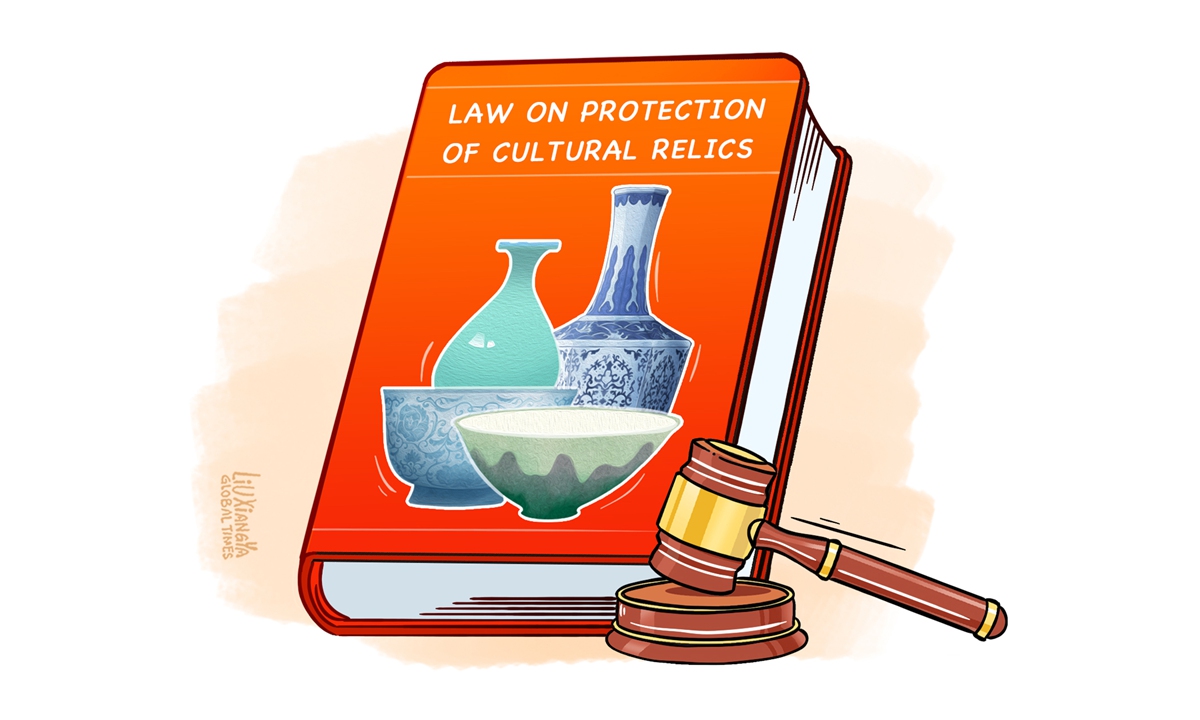
Illustration: Liu Xiangya/GT
The revised Law on Protection of Cultural Relics, adopted by the Standing Committee of the 14th National People's Congress on Friday, will take effect on March 1, 2025. It comprehensively implements new principles for cultural relics protection under current national guidelines and upholds scientific and democratic legislative processes to improve China's legal framework concerning cultural heritage.
One of the most noteworthy additions in this revision is a provision for the repatriation of cultural relics lost overseas, a topic of widespread social interest following the law's introduction.
Though China has achieved breakthroughs in cultural relics recovery, the lack of legislative support, particularly regarding the repatriation of lost cultural relics, remained a challenge and once limited the country's ability to recover artifacts through legal channels. From this perspective, the new provision addressing the repatriation of lost cultural relics represents a historic legislative advancement for China's cultural relic protection framework and crucial step in aligning China's domestic and international legal standards.
The revised law adds a new Article 81, which establishes a framework for relic repatriation. Article 81 comprises two clauses, with the first clause strengthening international cooperation in the area of relic repatriation, an overarching principle establishing China's basic stance.
This clause stipulates that the administrative department of cultural relics under the State Council shall, in accordance with the law and in cooperation with relevant departments, pursue the recovery of cultural relics lost abroad due to theft or illegal export. For foreign relics illegally imported into China, the state will cooperate with relevant countries to return these items based on applicable treaties, agreements, or reciprocity.
This marks the first time China has set a legal precedent for cultural relic repatriation, thereby securing a robust legal foundation for future efforts in this area. Several key points in this clause warrant attention.
First, this provision emphasizes the state's intent to strengthen international cooperation in relic repatriation rather than merely focusing on retrieving illegally exported cultural relics. China's role has shifted from that of a relic source country to one that sees both significant outflows and inflows of cultural artifacts.
In response, the law must support not only China's efforts to recover its own lost relics but also its obligation under international law to cooperate with other countries in returning foreign relics illegally imported into China. To this end, China has joined multilateral treaties such as the UNESCO 1970 Convention on the Means of Prohibiting and Preventing the Illicit Import, Export and Transfer of Ownership of Cultural Property and the UNIDROIT Convention on Stolen or Illegally Exported Cultural Objects, and has signed bilateral agreements with 27 countries.
These international frameworks require member states to prevent illicit outflows and inflows of cultural property, strengthening the global legal network against the illegal trade in cultural relics. This clause is thus not only a key measure for bolstering China's legal approach to relic recovery but also a demonstration of China's commitment to fulfilling its international treaty obligations and enhancing extraterritorial legislation.
Second, this clause designates the State Council's administrative department of cultural relics as the principal authority for pursuing lost relics overseas, while allowing flexibility to work with other departments as needed. Given the wide-ranging nature of cultural relics recovery, China's current practices involve collaboration among the National Cultural Heritage Administration, the police, the ministries of foreign affairs and justice, as well as academic institutions.
For individual cases, departments like customs, commerce, and the Hong Kong and Macao Affairs Office of the State Council may also be involved. This collaborative mechanism, now enshrined into the law, not only formalizes a multi-departmental approach in relic recovery but also strengthens China's coordinated international legal approach.
Additionally, this clause specifies that any cooperation with other countries in returning foreign relics illegally imported into China will be based on relevant treaties, agreements, or the principle of reciprocity. China is already a party to numerous international treaties concerning cultural relics recovery, and Article 30 of the Law on Foreign Relations stipulates that the State concludes or accedes to treaties and agreements in according with the Constitution and other laws and fulfills in good faith obligations stipulated in such treaties and agreements. Thus, cooperating with other countries to return foreign relics is both an international obligation and a natural extension.
This clause further establishes reciprocity as a principle in international cooperation on relic recovery to prevent any discriminatory practices from foreign countries in their cooperation with China.
The second clause of Article 81 states that the state reserves the right to recover cultural relics lost abroad due to theft or illegal export, and this right is not subject to statutory time limitations. In international law, statutes of limitation can be a barrier to relic recovery. For example, the UNIDROIT Convention establishes a framework for the statute of limitations on cultural property claims, with a relative limitation period of three years and an absolute limitation period of 50 years. By declaring that China's right to recover lost relics is not subject to statutory time limits, this clause addresses a major legal barrier, providing a critical foundation for future recovery efforts.
In summary, the revised Cultural Relics Protection Law represents a historic achievement in China's legal framework for cultural relics protection, as it marks a major step forward in enhancing China's use of legal tools to protect its heritage and fulfill its international obligations, underscoring the central leadership's strategic vision for unified domestic and international legal governance in cultural heritage.
The author is a professor at the School of International Law at China University of Political Science and Law.
life@globaltimes.com.cn




